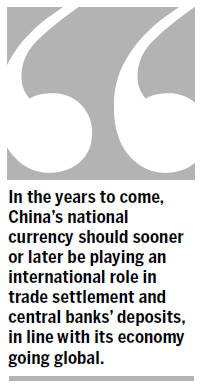Op-Ed Contributors
Over-reliance on US dollar
Updated: 2011-05-30 07:53
By Niu Tiehang (China Daily)

To get the imbalanced world economy onto a balanced track international monetary system needs reform
There are two sharply contrasting arguments to explain the global imbalances between the United States as the biggest trade deficit country and China as the biggest trade surplus country.
The first argument blames China as the major source of the imbalances, while the other seeks more fundamental reasons within the international monetary system (IMS) itself.
In fact, both arguments are two sides of the same coin. On the one side, the world economy is based on the US dollar, and the US dollar has always been regarded as a "public bus", providing a "free ride" to other currencies.
Apart from the network externality value to the US of widespread dollar usage, such a position also has an obvious economic advantage, known as "seigniorage". In return for injecting liquidity into world trade and investment, the US government, in exchange, receives goods and services from other countries.
Seigniorage can be realized only under two conditions: One is that the currency must be international; the other is that the issuer must be a sole or dominant importer.
In the past six-plus decades, the US dollar has played a pivotal role as catalyst for the post-war international trade and economy, which has enjoyed the greatest rate of development ever known.
|
||||
But as time has passed, the US dollar has been constantly injecting excessive liquidity into the world economic system. As a result, the US has accumulated a huge trade deficit, shared between 91 countries, among which China and Japan are the largest.
The US has fulfilled the two above-mentioned conditions for seignorage, despite possible conflicts of interest between short-term domestic and long-term international economic objectives - the so-called Triffin Dilemma, which was identified by Professor Robert Triffin in the late 1950s.
In 2009, Governor Zhou Xiaochuan of the People's Bank of China raised the question of whether the world would benefit from a supra-national currency, ideally the International Monetary Fund (IMF) Special Drawing Right, to avoid the risks of the Triffin Dilemma.
However, there is no certainty that this artificially created supra-national currency will ever come into being, so the practical issue confronting the world is this: If the creator of an international reserve currency cannot eliminate the Triffin Dilemma on its own, can the burden be shared with other emerging currencies, such as the Chinese renminbi, Brazilian real or Indian rupee, to make the global economy more balanced?
E-paper

Tapping into the future
Foreign companies are investing in China's water industry as many predict a growing profit margin.
Headhunters ride on growth
Commercial property rides wave
Learning from the past
Specials

Cuisine central
London's Chinatown is helping diners appreciate full palate of Chinese food

Tying the knot
Danish couple's high-end macrame export business takes off in the mountains of Yunnan.

Truly a super woman
Li Yuchun first came to prominence in 2005 as the Super Girl winner, and since then has become an international star.




